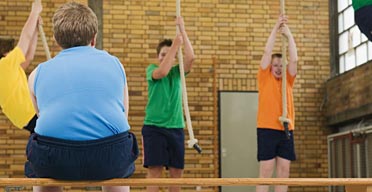
Schools should be doing more to convince teenage girls to take part in sport including scrapping "embarrassing" gym kits and offering alternative activities such as frisbee and yoga sessions in an effort to halt the growing obesity crisis, the secretary of state for families has told the Guardian.
Ed Balls said it was also up to parents to do more to tackle their children's obesity and academic underachievement, and the government cannot improve children's lives without their help.
An official study to be published on Wednesday will predict that half the population could be obese within the next 25 years. The Foresight report is also expected to say the epidemic will cost the country £45bn a year by 2050 if the loss of productivity from people who suffer obesity-related healthcare problems is added to the cost of treating them.
Today Mr Balls will tell a Guardian conference, the Healthy Kids Summit, that the government is ahead of a 2008 target to get 85% of pupils doing at least two hours of sports a week. But secondary schools are lagging behind primaries and girls are the least active once they hit adolescence.
"The way in which schools provide sports after 11 has a big impact on participation. Particularly for girls ... If you have a wider range of sports on offer, more alternative sports, more things like frisbee or yoga which are as health driving as any other in schools," Mr Balls said. "If the kit is awful or embarrassing it's much more likely the kids will forget to bring it."
Tomorrow Mr Balls, along with the School Food Trust, will step up the campaign to improve takeup of school dinners by another million pupils amid fears that the Jamie Oliver-led "revolution" in school meals is faltering.
An Ofsted report this month found that although many schools had introduced healthier meals, most had failed to sell the idea to their pupils and faced falling take-up. Mr Balls said the government needed to find new ways to convince parents to support efforts to tackle obesity.
"I don't think it's sensible for parents to be shoving meat pies through the fence outside the school but I'm not going to come along and say they must have this standard [of food] in their packed lunch boxes," Mr Balls said.
"There are things I can do on nutritional standards, there are things schools can do to lead this forward, but at the end of the day if parents aren't saying to children you need to have a healthy lunch, I can't demand parents take a different view.
"I have an instinctive reaction against anything that sounds like the nanny state and government ministers telling parents how to do their jobs. But at the same time... there are things we can do in schools to try to make sure children and young people and parents have got better choices and more information."
The Children's Plan, a fundamental review of all children's services to be announced in December, will set out ways to target parents who are struggling to support their children in school or who are condoning unhealthy lifestyles, he said.
Officials in his department are preparing a broad package of measures to subtly target disadvantaged families in an acknowledgment that many government policies are stalling because they are not reaching the right people.
Targets for the Department for Children, Schools and Families, published after the spending review last week, put a new onus on parents and cover everything from breastfeeding to stalling the rise in obesity among children.
Over the next year the department will study the part parents play in their children's education. "This work will identify key factors to differentiate between different types of parents, carers, and children and young people, which will allow the government to develop and implement policies that better reflect their families' different needs and target policies and communications to these different audiences more effectively," documents published with the new targets say.
Mr Balls rejected findings from another independent inquiry, the Primary Review, which last week reported a "pervasive anxiety" among children under the age of 11, which is being fuelled by worries about the state of the world but also by pressures in schools, most notably from national tests at seven, 11 and 14.
"I don't find that they are fearful or negative or depressed about the world. I find it exciting, but exciting and challenging at the same time. Everybody is trying to navigate through a faster-moving, more complex world and sometimes it worries you."
But he reiterated his commitment to national tests for primary school children.

